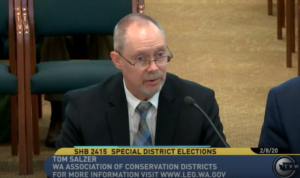WACD Testimony in Opposition to HB 2588, February 27, 2020

TESTIMONY
Today, WACD testified in opposition to ESHB 2588 titled “Improving openness, accountability, and transparency of special purpose districts.”
WACD opposed House Bill 2588 as written because it would impair the ability of conservation districts to attract local volunteers, and because it requires conservation districts to do certain things that other local governments are not required to do.
About conservation districts
The conservation districts of Washington State partner with private landowners – who own more than 50% of the land in our state – to voluntarily take action to keep our air, water, soil, and other natural resources abundant and healthy. They are community-based hubs of natural resource expertise and funding led and staffed by local people who understand the needs of the landscapes and of the communities that they serve.
Washington conservation districts are already highly accountable
Conservation districts already abide by the requirements in Title 89.08 RCW, are regularly audited by the State Auditor’s office, and fall under the purview of the Washington State Conservation Commission. It is notable that in the last three years, conservation districts and the Commission have been recognized twice with the State Auditor’s Stewardship Award. This level of oversight and accountability argues against requiring even more from conservation districts.
Our conservation districts work directly with the State Conservation Commission
We believe conservation districts are the only special purpose districts in this state with a state agency in place that provides guidance and support to these local units of special government. This bill would add new requirements to the operation of districts without much to show for those costs. It seems perverse to require these small local governments to do more than other local governments like cities and counties who have more resources available to them.
Requiring financial disclosure would have a chilling effect on recruiting district leaders
We are especially concerned with Section 12 of the bill that would require conservation district supervisors to complete campaign and personal finance disclosure forms. District supervisors serve as volunteers and receive no salary or stipend for their service. Section 12 adds another barrier at a time when volunteerism in many organizations is on the decline. It would shrink the pool of qualified individuals available to provide the excellent leadership and governance that conservation districts demonstrate year after year. Our districts are non-partisan, non-regulatory, non-taxing units of government and we are concerned about the impact that House Bill 2588 – and in particular, Section 12 of the bill – would have on the mission and capacity of conservation districts.
